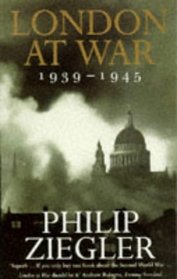Winston Churchill once stated, "If the Empire lasts a thousand years men will say, 'This was their finest hour.'" He was speaking of the lonely British stand again the Nazis for almost two years before the United States entered the war. And he had good reason to do so. The free world owes a debt of gratitude to lose who kept the fight going when there appeared to be no hope. Even after the U.S. entered the war, Britain and the U.S. suffered defeat after defeat, until the tide first began to turn.
This book recounts what the people of that island endured for six years, mostly the events in London. That city endured many more air attacks than other British cites. Of the estimated total of 147,000 fatal and serious casualties suffered, 80,000 were in London. On the average, Londoners had a raid warning every 36 hours for over five years and 30% of the city was destroyed.
Yet this is not a glorified description of the "Blitz," as, in many ways, what the Londoners endured were hardships created by their own city and national governments. And many of these are recounted here. Some are---even in time of war and death---humorous. Many were often created by fellow citizens, as often fire and medical personnel responding to bombed out buildings had to deal with the looters who had arrived first. And sometimes the antiaircraft fire killed more Londoners than German bombs.
Still the quote I remember most was that from one elderly female Londoner who, when asked whether she hated the bombing raids, replied that she liked them, "because while they were going on they made me forget about the war." This isn't as inane as it sounds. While she was in a shelter listening to the bombs falling she forgot about the bad news coming in from around the world. It wasn't until late 1942 that the news started getting better.
This book recounts what the people of that island endured for six years, mostly the events in London. That city endured many more air attacks than other British cites. Of the estimated total of 147,000 fatal and serious casualties suffered, 80,000 were in London. On the average, Londoners had a raid warning every 36 hours for over five years and 30% of the city was destroyed.
Yet this is not a glorified description of the "Blitz," as, in many ways, what the Londoners endured were hardships created by their own city and national governments. And many of these are recounted here. Some are---even in time of war and death---humorous. Many were often created by fellow citizens, as often fire and medical personnel responding to bombed out buildings had to deal with the looters who had arrived first. And sometimes the antiaircraft fire killed more Londoners than German bombs.
Still the quote I remember most was that from one elderly female Londoner who, when asked whether she hated the bombing raids, replied that she liked them, "because while they were going on they made me forget about the war." This isn't as inane as it sounds. While she was in a shelter listening to the bombs falling she forgot about the bad news coming in from around the world. It wasn't until late 1942 that the news started getting better.




